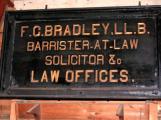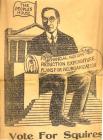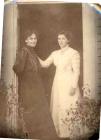14
Bradley did well at Dalhousie. He was law librarian and in his graduating year was elected class president. It was here that he became a believer in confederation. After graduating with an LLB in 1914 he returned to St. Johns where he enrolled as a solicitor and was called to the Bar in1915.In 1918 he was practising law in partnership with Alfred B. Morine.
15
Shingle from the law offices of F. Gordon Bradley.1939
Mockbeggar Plantation, Provincial Historic Site, Bonavista, Newfoundland

16
Bradley worked with Morine until 1922 when he started his own practice. Morine was one of the finest lawyers in St. John's and Bradley profited greatly from experience he gained there. Morine was a prominent politician and tried to convince Bradley to become politically involved. However Bradley's own reputation as a lawyer was growing and he had set his mind on becoming a Judge. He did not think law and politics would mix.18
In 1915 F. Gordon Bradley Joined the Masons. Around the same time he joined the Loyal Orange Association. Fraternal organizations were very popular and it would do an ambitious young man well to be involved in them.20
Bradley finally decided to enter politics in 1923 when he ran in Trinity Bay as a candidate for the Liberal-Labour-Progressive Party. His earlier misgivings about politics were justified as he was promptly defeated. It was probably just as well. Bradley was a liberal at heart and the Liberal-Labour- Progressive party had little to do with labour or anything liberal. It was made up mostly of Conservatives representing the country's merchant and professional elite. The main thing the party members had in common was their dislike for Sir Richard Squires, leader of the Liberal party, and his allies Sir William F. Coaker and the Fishermans Protective Union. His luck at that time was not all bad. During the campaign he attended a meeting of the Grand Lodge of the Loyal Orange Association in Grand Falls and was installed as Grand Master. His association with the Orange Lodge would serve him well in a later and much more important Campaign.22
On June 23, 1923, F. Gordon Bradley married Ethel Louise Roper. She was the daughter of John and Annie Roper. Mr. Roper, originally from St. John's, was the stipendiary magistrate and a successful businessman. Annie Roper was from Catalina. Her family, the Snelgroves, was a well to do, outport merchant family.23
Bradley House11 July 2003
Mockbeggar Plantation, Provincial Historic Site, Bonavista, Newfoundland

24
The Bradleys were married in the parlour of her parent's house at the Mockbeggar Plantation in Bonavista which would later become their home.25
Despite his initial defeat Bradley became involved in the complicated political situation that Newfoundland found itself in the early 1920's. Internal strife plagued Prime Minister Sir Richard Squires' Government. Charges of corruption forced Sir Richard to resign weeks after taking office and he hired Bradley as his lawyer. The two men had much in common and became allies.Within a year the Liberal Government had fallen and in the election that followed Bradley ran again as a candidate for the Liberal-Labour-Progressive Party. They were now called the Liberal-Conservative Party with the stress on Conservative. He won by a narrow margin in the district of Port de Grave and became a minister without portfolio under Prime Minister Walter S. Monroe.
Bradley soon became disenchanted with conservative politics. The government passed legislation that blatantly favoured the wealthy and penalized workers and fishermen. Bradley, along with several others, crossed the house to sit in opposition. He began to attack the government for its class bias in favouring the wealthy St. John's Merchants.
"In Spite of my protest the necessities of the working man were put up to seventy-five per cent in some cases, and a duty put on lines and twines which have been free for twenty-five years. I should have left the party then. My complaint is that taxes have been piled on the fishermen. They have been allowed to go down as far as the wealthy classes are concerned. Where is the income tax today? Where is the profits tax? What about the concessions given Capital? It is a harrowing tale."
F. Gordon Bradley, 1923.
Bradley was often an outspoken supporter for working people but it would be wrong to think of him as a radical socialist or demagogue. His heart was with the fishermen and working class people of outport Newfoundland. That's where his roots were. He would make his home there. He liked the ideas of socialism but believed they were unworkable in a practicable sense. He believed in the rule of law and government and thought that democracy was the best option for social justice. He was an eloquent speaker and brilliant speechmaker but was not prone to use dramatics and emotionalism to make his point.
26
Political cartoon of Sir Richard Squires from the ''Liberal Press.''21 May 1932
St. John's, Newfoundland



